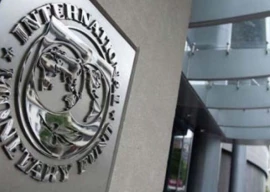
A new International Monetary Fund report showed that Pakistan is set to miss this fiscal year’s budget deficit target by approximately Rs1 trillion, as the global lender anticipates the country’s increased reliance on loans in the coming years.
The IMF released the report from Washington on the same day Pakistan’s finance minister sought assistance from the United States for “debt financing”.
The Fiscal Monitor report of the IMF indicated that the gap between expenditure and revenues may remain at 7.4% of the Gross Domestic Product (GDP) for the fiscal year 2023-24 ending in June. This figure is nearly Rs1 trillion or 1% of the GDP higher than the deficit limit approved by the National Assembly.
Despite the successful completion of the $3 billion IMF programme, the government is expected to miss the budget deficit target. Last year, the IMF forced Pakistan to amend the budget after its presentation in the National Assembly to make it more realistic. Yet, the target of 6.5% of the GDP or Rs6.8 trillion is projected to be missed by Rs1 trillion, necessitating additional borrowings from banks.
The IMF report forecasts that during the next fiscal year, Pakistan’s budget deficit may hover around 7.3% of the GDP — a level deemed unsustainable and likely to increase the country’s debt burden.
Furthermore, the Fiscal Monitor report suggests that Pakistan’s overall budget deficit from fiscal year 2024 to 2029 will remain in the range of 5.8% of the GDP.
The widening gap between expenditure and revenues has left the federal government at the mercy of commercial banks.
Due to the IMF’s policy of completely closing the central bank borrowing window for the federal government, commercial banks are now fully exploiting the federal authorities. With the budget deficit consistently exceeding 7% of the GDP, the central bank is indirectly lending to the federal government through commercial banks, leading to increased government borrowing costs.
Interest payments are estimated to range between Rs8.3 trillion to Rs8.5 trillion during this fiscal year, significantly surpassing the projected net income of the federal government and the single largest expenditure.
Read Budget deficit increases to Rs8.54tr
Meanwhile, Finance Minister Muhammad Aurangzeb met with the Chief Executive Officer of the United States International Development Finance Corporation (DFC), Scott Nathan, on Tuesday.
According to the finance ministry statement, “Finance minister requested DFC’s assistance in the areas of debt financing, political risk insurance, and capacity building to develop and implement potential DFC projects.”
The US Treasury Secretary Janet Yellen and the US Secretary of State Antony Blinken are members of the board of directors of the DFC.
The IMF Fiscal Monitor report showed that the government’s total revenues may remain at 12.5% of the GDP during this fiscal year, which is expected to slightly decrease to 12.4% in the next fiscal year.
In comparison, government expenditures are estimated to be 19.9% of the GDP for this fiscal year, which may marginally decrease to 19.6% in the next fiscal year. However, in absolute terms, expenditures will remain significantly higher than this fiscal year, maintaining the government’s dependency on banks.
Aurangzeb also addressed the JP Morgan Seminar on Pakistan’s Economic Policy Outlook. According to the finance ministry, the minister outlined three crucial reform areas: taxation, energy, and privatisation, as priorities of his government.
However, just days before departing for Washington to discuss fiscal policy, Aurangzeb approved four salary increases for officers of the Prime Minister’s Office. This decision suggests that the government may not fully grasp the gravity of the fiscal situation.
The report indicates that Pakistan may achieve the primary budget surplus target of 0.4% of the GDP for this fiscal year. However, the World Bank stated earlier this month that the country is likely to miss this core IMF goal of achieving a primary surplus by the end of the fiscal year.
The Fiscal Monitor report suggests that the record number of elections being held worldwide in 2024 poses a significant risk to fiscal consolidation prospects for the year. The 88 economies or economic areas that have already had or are expected to hold nationwide elections include Bangladesh, Brazil, the European Union, India, Indonesia, Mexico, Pakistan, Russia, the United Kingdom, and the United States. These economies represent more than half the world’s population (or 4.2 billion people and 55% of global GDP).
According to the IMF report, there has been little change in the distribution of debts, deficits, and public finance risks and vulnerabilities globally. It added that while monetary policy remained restrictive in more than 85% of the world’s economies in 2023, only half of them tightened fiscal policy, down from about 70% in 2022.
After sharp declines in 2021–22, global public debt edged up again in 2023 and remained above pre-pandemic levels by 9 percentage points of GDP. The share of low-income countries and emerging markets in or at high risk of debt distress remained elevated. The finance minister held a meeting with Ajay Banga, President of the World Bank Group, and highlighted the government’s commitment to advancing reforms in taxation, energy, and privatisation sectors. Both sides agreed on the need for a rolling Country Framework Plan for 10 years.
Published in The Express Tribune, April 18th, 2024.
Like Business on Facebook, follow @TribuneBiz on Twitter to stay informed and join in the conversation.




1730884134-0/BeFunky-collage-(26)1730884134-0-165x106.webp)



1730963708-0/Express-Tribune-Web-(27)1730963708-0-270x192.webp)












COMMENTS
Comments are moderated and generally will be posted if they are on-topic and not abusive.
For more information, please see our Comments FAQ